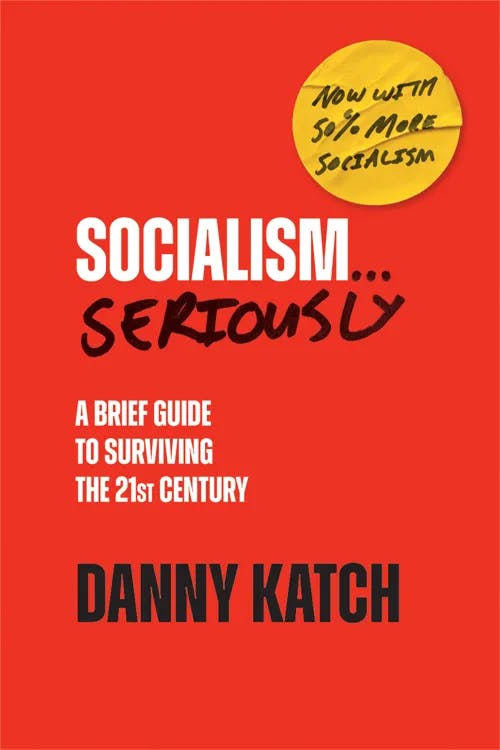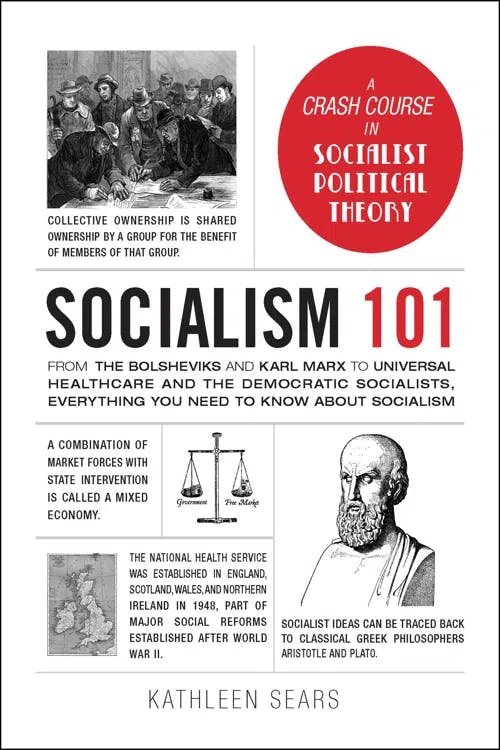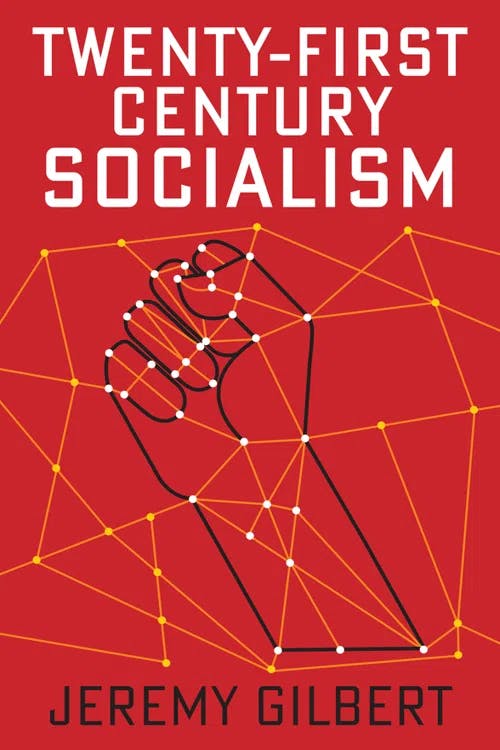What is Socialism?
MA, English Literature (University College London)
Date Published: 01.06.2023,
Last Updated: 05.10.2023
Share this article
Defining socialism
“Socialism” is a disputed and emotive term, as it is often conflated with communism and the specter of totalitarian, one-party states. Although socialism shares some common ground with communism (as we will explore), there are a number of crucial distinctions between them. Before we discuss these differences in more depth, however, what does “socialism” itself actually mean?
In a basic sense, socialism refers to a family of philosophical, political, and economic theories which advocate for greater social ownership of the means of production. In other words, socialist theories and systems argue that workers should be granted more control over the assets and capital they produce, as well as the societies they live in. Socialism is seen as belonging to the left of the political spectrum.
It is important to note that there are many different kinds of socialism, such as democratic socialism and social democracy. Rather than referring to a singular, clearly delineated theory, socialism more accurately refers to a complicated web of interrelated theories which share some fundamental principles, such as greater social ownership of the means of production and the capital that is produced, and egalitarian policies designed to combat the negative effects of capitalism (see our study guide “What is Capitalism?”).
To further complicate matters, the term “socialism” has taken on a host of competing meanings and associations since it emerged as a distinctive movement in the nineteenth century. It is not possible to sift through this historical detritus to arrive at a pure and unblemished definition of “socialism”, as it remains a disputed term to this day. Despite these difficulties, we will now attempt to paint — with broad, imperfect brush strokes — a general picture of socialism, with signposts along the way for further reading into the many different subcategories it contains.
A brief history of socialism
The origins of socialism
The precise origins of socialism can be difficult to trace, as there are many examples of socialist-adjacent thought throughout history. As Danny Katch argues in Socialism . . . Seriously (2023),
There have been many philosophies throughout history that would be considered socialist today, from the ideas that governed a number of Indigenous societies over hundreds of years to the anti-imperialist and egalitarian teachings of that radical Palestinian Jew, Jesus Christ.
Danny Katch
There have been many philosophies throughout history that would be considered socialist today, from the ideas that governed a number of Indigenous societies over hundreds of years to the anti-imperialist and egalitarian teachings of that radical Palestinian Jew, Jesus Christ.
Other scholars of socialism, such as Kathleen Sears, argue that
The political theorists of the sixteenth and seventeenth centuries laid the foundation for later socialist thought with their enquiries into the relationship between the one, the few, and the many. Questions of equality and inequality, the distribution of wealth, the basis for authority, and the rights of man (narrowly defined) were now part of the public discourse. (2019)
Kathleen Sears
The political theorists of the sixteenth and seventeenth centuries laid the foundation for later socialist thought with their enquiries into the relationship between the one, the few, and the many. Questions of equality and inequality, the distribution of wealth, the basis for authority, and the rights of man (narrowly defined) were now part of the public discourse. (2019)
Sears pays particular attention to the more egalitarian societies envisioned in Thomas More’s Utopia (1516) and James Harrington’s Commonwealth of Oceana (1656) — which went on to influence the Founding Fathers of the United States (2019).
However, as Peter Lamb explains, socialism did not emerge as a “distinctive political movement” until “the industrial revolution in the early nineteenth century” (Socialism, 2019). At this time, the rapid development of capitalism and abusive practices by employers led to an increase of what would later be called socialist thought. Some of the earliest, and most influential, socialist thinkers later became known as utopian socialists — with key figures being Robert Owen, Charles Fourier, Henri de Saint-Simon, and Étienne Cabet. As Keith Taylor explains in Political Ideas of the Utopian Socialists (2013),
[Utopian socialist thinkers] shared a common concern for the plight of the poorest sections of society, and they all attempted in their various ways to show how a much greater level of equality could be achieved. In this respect they were collectively responsible for laying the foundations for the development of modern socialist doctrines.
Keith Taylor
[Utopian socialist thinkers] shared a common concern for the plight of the poorest sections of society, and they all attempted in their various ways to show how a much greater level of equality could be achieved. In this respect they were collectively responsible for laying the foundations for the development of modern socialist doctrines.
Despite being disparaged for their perceived naivety by later thinkers such as Karl Marx (1818–1883) and Friedrich Engels (1820–1895), the utopian socialists laid much of the groundwork for the developments that would follow.
Marx and Engels are key foundational figures for both socialism and communism. Works such as The Communist Manifesto (1848), and Marx’s Das Kapital (1867–94), have been incredibly influential in terms of explicating the negative effects of capitalism — and providing an alternative vision of socialism and communism. Marx and Engels provided dialectical and historical materialism as the explanations for society’s makeup; interpreting history as a story of struggle between the working class (the proletariat) and capitalists (the bourgeoisie). Marxism, as it became known, had a formative influence on much later socialist thought.
Marxism was also foundational to communist thought — playing a key role in the Russian Revolution in the form of Marxism–Leninism, before developing into Stalinism and the Soviet Union. Other communist states, such as the People’s Republic of China, then followed. As the current discussion is focused on the history of socialism rather than communism, however, we will not go into detail here. For more information, our "What is Communism?" study guide explores communism in greater depth.
The development of socialism
As opposed to communism, which took on increasingly totalitarian guises throughout the twentieth century, socialism became increasingly defined as a democratic ideology which stopped short of arguing for a communist state. In Western countries in particular, socialism became associated with democratic socialist/social democratic governments and policies. Just some of the key examples include:
- In the UK, the post-war Labour government led by Clement Attlee. Between 1945 and 1951, Attlee’s government introduced a series of wide-ranging socialist policies — including the creation of the welfare state, the creation of the National Health Service (NHS), and the nationalization of key industries. These policies were influenced by Keynesian economics, as well as the 1942 Beveridge Report (Sears, 2019).
- In European countries such as Sweden, Norway, Denmark, Finland, and Iceland, the widespread introduction of socialist policies became known as the Nordic model. With social democratic parties mostly dominant in Nordic countries from 1945 to the present day, the Nordic model has been held up as an example of how capitalism can be successfully reformed for the benefit of society. (For more information, Mary Hilson’s The Nordic Model (2008) provides an insightful overview of the topic.)
- It is not just Europe, either — in The "S" Word (2011), John Nichols argues that “Socialist ideas [...] have shaped and strengthened America across the past two centuries”, with just one example being the introduction of Medicare:
Americans would not have gotten Medicare if Harrington and the socialists who came before him—from Socialist Party presidential candidates such as Eugene Victor Debs and Norman Thomas, to organizers such as Mary Marcy and Margaret Sanger, and the Communist Elizabeth Gurley Flynn—had not for decades been pushing the limits of the debate about health care to the left. (2011)
John Nichols
Americans would not have gotten Medicare if Harrington and the socialists who came before him—from Socialist Party presidential candidates such as Eugene Victor Debs and Norman Thomas, to organizers such as Mary Marcy and Margaret Sanger, and the Communist Elizabeth Gurley Flynn—had not for decades been pushing the limits of the debate about health care to the left. (2011)
To explore the key developments of socialism in more detail, Socialism 101 (2019) by Kim Sears is an invaluable resource.
The anatomy of socialism
Now that we have a clearer picture of socialism’s history, let’s delve deeper into its precise theoretical makeup. At a fundamental level, socialism is contrasted with capitalism, where “goods and services are produced socially, but they and the wealth they generate are owned privately”, as Sears explains (2019). The view of socialists, instead, is that
goods and services that are produced socially should be owned socially. Such goods and services should not be created for private profit but for public good, administered through the state. In this way, the state becomes a means of social equality and justice. (2019)
Katch echoes these views, arguing that
The essence of socialism is that workers can use the collective organization that they have learned under capitalism to create not just cooperative workplaces but a cooperative society geared to meet humanity’s needs instead of a competitive one geared to maximize profit. (2023)
A key underlying principle of socialism, then, is that the pursuit of capitalistic profit and the good of humanity do not go hand in hand. Socialism presents itself as an antidote to a capitalistic model in which profit takes precedence over all else, including the welfare of humans and the environment.
Katch argues that socialism is, in essence, a more developed form of democracy — one in which working people are given more say over how the fruits of their labor are distributed. Instead of limiting democracy to a brief election day, socialism would “broaden the bases of decision-making to thousands of buildings and public squares and community centers” (2023). Katch writes,
It is this type of radical participatory democracy, functioning as the foundation of a centrally organized political and economic system, that is the heart of the socialist vision. (2023)
The present capitalist model, Katch argues, presents only a veneer of democracy — in which a minority of super-rich capitalists actually have the power to decide how our societies are structured, and in what ways the capital produced by the majority’s labor is used. Katch’s argument, in essence, is that socialism returns more democratic power to the majority — working people. Katch suggests that a “fuller working definition of socialism” should therefore begin with two “far-reaching concepts”:
1. Working people control the government.
2. The government controls the economy. (2023)
Here, Katch echoes the thoughts of Marx and Engels. In The Communist Manifesto (1848 [2014]), Marx and Engels argue that
The executive of the modern State is but a committee for managing the common affairs of the whole bourgeoisie.
Karl Marx and Friedrich Engels
The executive of the modern State is but a committee for managing the common affairs of the whole bourgeoisie.
By “bourgeoisie”, Marx and Engels mean the capitalist class of business owners who exploit the labor of the “proletariat, the modern working class” (1848 [2014]).
This concept of the exploited working class is a central feature of socialism, along with its related opposition to capitalist wealth distribution. Socialism argues that workers should receive a fairer share of the capital that their labor produces, instead of this capital being concentrated in the hands of those who own the companies. Socialism contends that workers create more value than they are compensated for by their employers — in Das Kapital (1867–94 [2012]), Marx describes this as “surplus value”. Meanwhile, the excess profit produced by workers is spread among shareholders and the huge salaries of executives, or reinvested in order to produce more capital for the capitalist class. Socialism, in short, argues that workers are being unfairly compensated for the value they create — and that this surplus value is instead appropriated by those who own and invest in companies, and possess the “means of production” (Marx and Engels, 1848 [2014]). (For more information, see our study guide “What is Marxism?”.)
It is this line of thinking which leads socialists to believe that the means of production should be owned by the proletariat (workers), instead of the bourgeoisie (business owners). As Pablo Gilabert and Martin O'Neill explain,
Both socialism and capitalism grant workers legal control of their labor power, but socialism, unlike capitalism, requires that the bulk of the means of production workers use to yield goods and services be under the effective control of workers themselves, rather than in the hands of the members of a different, capitalist class under whose direction they must toil. (“Socialism”, in The Stanford Encyclopedia of Philosophy, 2019)
Now that we have a firmer grasp of socialism’s general characteristics, let’s explore some of the different forms that socialism can take — including the widely debated differences between socialism and communism.
Socialism vs. communism: what’s the difference?
The precise differences between socialism and communism are a matter of controversy — Marx and Engels, for example, often used both terms interchangeably. Although communism is sometimes understood as a more extreme form of socialism, the two terms have now substantially diverged. Socialism has come to be seen as a more moderate ideology which advocates peaceful change via the democratic process. Communism, on the other hand, advocates for the complete and forceful overthrow of the capitalist system. Communism has been severely criticized for its undemocratic nature, and the human suffering revolutionary violence would inevitably lead to. Some communists, however, deny that the social revolution they advocate would involve violence.
Although both communism and socialism argue for public ownership of the means of production (to varying degrees), the nature of society envisioned by socialism and communism is very different. In addition to socialism’s non-violence, some of the key differences between socialism and communism can be summarized as follows:
- Under socialism, individuals would still be allowed to own private property. The profit motive is also preserved, as absolute equality of outcome is not in place — it is possible to earn and own more than others. Under communism, in contrast, there is no private property and each citizen is given what they are judged to need (without reference to their contribution). Communism advocates a completely classless society of absolute equality, whereas socialism does not.
- Socialism is compatible with existing forms of democracy, and does not aim to replace it with a “dictatorship of the proletariat” (Marx, cited in Sears, 2019). Similarly, socialism does not aim to eradicate the existence of money or the state.
The history of socialist thought has a complicated relationship with Marxism, and the communism it was influenced by and then defined itself against. In Socialism (2019), Lamb stresses that socialist theories “take into consideration the historical, social and cultural conditions of the country or countries in which their preferred state is intended to be introduced or further developed”. Rather than collecting them all together into one homogenous blob, it instead needs to be recognised that many countries have their own individual traditions and movements. On the distinction between communism and socialism as a whole, Lamb writes that
the communist–social democratic dichotomy does not capture every sort of socialist thought. Some socialist movements, groups, parties and the ideas and theories which inspire them do not fit even loosely into either side. (2019)
Peter Lamb
the communist–social democratic dichotomy does not capture every sort of socialist thought. Some socialist movements, groups, parties and the ideas and theories which inspire them do not fit even loosely into either side. (2019)
In the following section, we will take a closer look at some of these disparate socialist theories — while keeping in mind that an authoritative or exhaustive classification of them may be something of a fool’s errand.
Democratic socialism and social democracy
An important distinction has to be made between communism, then, and the democratic forms of socialism which the term “socialism” now generally applies to. These democratic forms of socialism are not all the same, however, as they disagree about how (and how much) socialism should be implemented.
Two of these key forms of socialism are sometimes referred to as democratic socialism and social democracy. As the confusing similarity in their names suggests, there is a lot of overlap between these two concepts, and the names are sometimes used interchangeably.
- Democratic socialists usually argue that capitalism should be replaced by a socialist economy via a peaceful and democratic process. The aim is still largely revolutionary, but the means are democratic. As with all types of socialism, however, it is difficult to mark clear dividing lines — some democratic socialists might identify more with revolutionary socialism, while others may identify more with social democracy. The US senator Bernie Sanders is one of the most prominent examples of a democratic socialist. As Sears summarizes,
[Sanders] argues for largely following the Scandinavian model of socialism, including universal healthcare and education, and for substantially increasing taxes on large corporations and wealthy individuals. (2019)
- Social democrats are similarly in favor of the introduction of socialist policy by democratic means, but they argue that it is sufficient to merely reform and regulate capitalism (rather than replace it wholesale). Social democrats, then, belong firmly in the reformist camp of socialist thought. Social democrats are in favor of a mixed economy, with both public and private ownership. In many ways, social democracy can be seen as a compromise between socialism and capitalism. This modern iteration of social democracy has often been identified with the “notion of ‘The Third Way’” (Lamb, 2019). The ex-UK Prime Minister Tony Blair is regarded as a key example of a social democrat. As Lamb explains,
Social democrats hold that a form of socialism at least tolerable to people of other ideological persuasions can be introduced by means of regulation, achieved through parliamentary politics. Some social democrats in the early 1990s argued that a revived or resuscitated socialism need not attempt to uproot capitalism but rather could subject it to significant reform and control. In 1994, such a mild social democratic view was voiced by the new British Labour Party leader, Tony Blair. (2019)
Democratic socialists are seen as residing on the “left” of the political spectrum, while social democrats are usually seen as occupying the “center-left”. Some social democrats argue that the full socialism advocated by democratic socialists is unrealistic, or even undesirable. They often position themselves as the most practical and feasible way of ameliorating the worst effects of capitalism. Supporters of Tony Blair’s brand of social democratic “New Labour”, for example, point to the electoral success of their model — and the improvements in public services and reduced levels of poverty that were brought about as a result.
Democratic socialists, in contrast, argue that social democrats do not go far enough — that they have abandoned their socialist principles, and fatalistically accepted the continuing damage caused by neoliberal policies. Democratic socialists often argue that successive capitalist crises, such as the Great Recession from 2007 onwards, indicate that the capitalist model is unsustainable. With increasingly rampant inequality and widespread discontent among the working class, democratic socialists argue that capitalism needs more radical change — and that supporters of the capitalist status quo are only emboldening the far right, who blame immigration and other aspects of globalization for capitalism’s failures. Supporters of Bernie Sanders, for example, point to his increased popularity — as well as the particular success of other progressive politicians in recent elections, such as Alexandria Ocasio-Cortez.
In the long history of socialist thought, many types and subtypes have sprung up — so many, in fact, that it is impossible to unpack them all here. To explore such concepts in more detail, there are a wealth of resources available in Perlego’s Communism, Post-Communism & Socialism section.
Socialism now and in the future
The rise of democratic socialist politicians such as Bernie Sanders and Alexandria Ocasio-Cortez, as mentioned above, brings our discussion of socialism right up to the present day. They (and others) have spearheaded a new movement in US politics, bringing legions of new supporters to the ideas of democratic socialism.
With inequality ballooning to unprecedented levels in many countries, along with the harmful environmental effects of capitalism, many socialists argue that the case for socialism becomes even more pressing with each passing year. In Twenty-First Century Socialism (2020), Jeremy Gilbert proposes that “a twenty-first-century socialism is the only reasonable solution to the various crises and problems that the world faces today – from social inequality to climate breakdown.” Gilbert identifies capitalism as the underlying cause of these problems, and makes the case for socialism’s continuing relevance as an urgently needed remedy:
So why should anyone believe that this nineteenth-century philosophy [socialism] could have the answer to twenty-first-century problems?
Because our major problems today have exactly the same cause as the major problems faced by people in the early 1800s: industrial pollution, urban squalor, growing inequality, social insecurity, a widespread sense that society was falling apart and that nobody knew what to do about it, while a few were getting very rich as a result. Sounds familiar? (2020)
Jeremy Gilbert
So why should anyone believe that this nineteenth-century philosophy [socialism] could have the answer to twenty-first-century problems?
Because our major problems today have exactly the same cause as the major problems faced by people in the early 1800s: industrial pollution, urban squalor, growing inequality, social insecurity, a widespread sense that society was falling apart and that nobody knew what to do about it, while a few were getting very rich as a result. Sounds familiar? (2020)
Similarly, in After Capital (2018) Couze Venn traces the role of capitalism in producing the “correlated crises” that now face society, and makes the case for change:
The all too visible signs are the converging crises concerning the global economy, the environment, the depletion of non-renewable resources, increasing violences and the breakdown of social cohesion; they threaten a perfect storm in the near future.
Couze Venn
The all too visible signs are the converging crises concerning the global economy, the environment, the depletion of non-renewable resources, increasing violences and the breakdown of social cohesion; they threaten a perfect storm in the near future.
With environmental concerns only accelerating, a growing ecosocialist movement will be aiming to arrest the tide of capitalist damage and (quite literally) save the world.
Further reading on Perlego
Socialism: A Short History by Norman Mackenzie
Four Futures: Life After Capitalism by Peter Frase
Post Growth: Life after Capitalism by Tim Jackson
The Routledge Handbook on Ecosocialism, edited by Leigh Brownhill et al.
Introducing Marx: A Graphic Guide by Rius
Socialism FAQs
What is socialism in simple terms?
What is socialism in simple terms?
What is the difference between socialism and capitalism?
What is the difference between socialism and capitalism?
What is the difference between socialism and communism?
What is the difference between socialism and communism?
Bibliography
Gilabert, P. and O’Neill, M. “Socialism”, The Stanford Encyclopedia of Philosophy. Fall 2019 Edition. Available at: https://plato.stanford.edu/archives/fall2019/entries/socialism/
Gilbert, J. (2020) Twenty-First Century Socialism. Polity Press. Available at: https://www.perlego.com/book/1536701/twentyfirst-century-socialism-pdf
Hilson, M. (2008) The Nordic Model. Reaktion Books. Available at: https://www.perlego.com/book/2866733/the-nordic-model-scandinavia-since-1945-pdf
Honneth, A. (2016) The Idea of Socialism. Polity Press. Available at: https://www.perlego.com/book/1536291/the-idea-of-socialism-towards-a-renewal-pdf
Katch, D. (2023) Socialism . . . Seriously. Haymarket Books. Available at: https://www.perlego.com/book/3783592/socialism-seriously-a-brief-guide-to-surviving-the-21st-century-revised-updated-edition-pdf
Lamb, P. (2019) Socialism. Polity Press. Available at: https://www.perlego.com/book/1536703/socialism-pdf
Marx, K. and Engels, F. (2014) The Communist Manifesto. HarperCollins Canada. Available at: https://www.perlego.com/book/602671/the-communist-manifesto-pdf
Marx, K. (2012) Das Kapital. Gateway Editions. Available at: https://www.perlego.com/book/784600/das-kapital-a-critique-of-political-economy-pdf
Nichols, J. (2011) The ‘S’ Word. Verso US. Available at: https://www.perlego.com/book/731346/the-s-word-a-short-history-of-an-american-traditionsocialism-pdf
Pons, S. and Service, R. (2022) A Dictionary of 20th-Century Communism. Princeton University Press. Available at: https://www.perlego.com/book/3227422/a-dictionary-of-20thcentury-communism-pdf
Sears, K. (2019) Socialism 101. Adams Media. Available at: https://www.perlego.com/book/1719533/socialism-101-from-the-bolsheviks-and-karl-marx-to-universal-healthcare-and-the-democratic-socialists-everything-you-need-to-know-about-socialism-pdf
Taylor, K. (2013) Political Ideas of the Utopian Socialists. Taylor and Francis. Available at: https://www.perlego.com/book/1579126/political-ideas-of-the-utopian-socialists-pdf
Venn, C. (2018) After Capital. SAGE Publications. Available at: https://www.perlego.com/book/1232834/after-capital-pdf
Wilczynski, J. (2019) An Encyclopedic Dictionary of Marxism, Socialism and Communism. De Gruyter. Available at: https://www.perlego.com/book/1165201/an-encyclopedic-dictionary-of-marxism-socialism-and-communism-economic-philosophical-political-and-sociological-theories-concepts-institutions-and-practices-classical-and-modern-eastwest-relations-included-pdf
MA, English Literature (University College London)
Andy Cain has an MA in English Literature from University College London, and a BA in English and Creative Writing from Royal Holloway, University of London. His particular research interests include science fiction, fantasy, and the philosophy of art. For his MA dissertation, he explored the presence of the sublime in Shakespeare’s plays.








